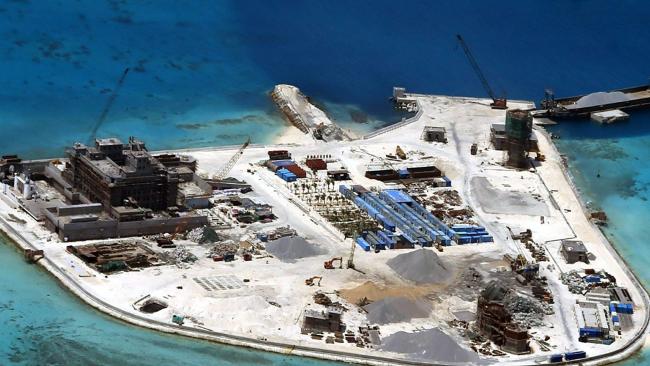Since the end of Second World War, the United States has been the leading military and economic power not just in the Americas, but in the world. This status is being challenged on an almost daily basis by a nation amassing more and more global power. According to the Yale Economic Review, China’s economy has been accelerating at a growth rate in the double digits.1 This presents a great concern for many involved in American foreign policy. A question persists: is China a friend or a foe of the United States? For many years, the fast-growing Chinese economy was troubling, but in recent years, the Chinese have also increased their military power by their amplified presence in the South China Sea. A few years ago, China made the unprecedented move of militarizing the South China Sea by constructing man made islands in the area over the Spratly Islands.2 Not only is the prospect of a more agile Chinese military a grave threat, but what does this mean for Chinese territorial waters? Does creating installations on artificial islands extend Chinese territorial claims into international waters? This question has been worrying many in foreign policy and leads to the second question of how can the U.S. prevent further encroachments by China? Fortunately, the UN Convention on the Law of Sea has the answer.3

Beginning in 2014, Chinese President Xi Jinping ordered his military to begin militarizing small patches of land in the South China Sea that are collectively called the Spratly Islands.4 The Spratly Islands are home to a wide array of oceanic life and are claimed not just by China, but also by the Philippines and Vietnam. President Xi Jinping refused to let these conflicting claims deter him from making his country’s military presence in the area greater and more mobile. Chinese military engineers began covering various islands in tons of additional sand to build them up and make them more stable. After this step, the Chinese military built communications towers and then, frighteningly, they constructed missile silos on these islands. China is also making sure no fishermen from the Philippines, nor individuals from any other nation come close to the artificial land masses.5. The United States’ Navy has performed many drills in the region that were harshly denounced by China who claims that the US Navy is threatening its sovereignty. This raises a series of other questions, however, as several other nations are declaring that the Spratly Islands fall within their exclusive economic zones.
According to the 1982 UN Convention on the Law of the Sea, territorial waters originate at a nation’s coastal baseline, which is the low water mark of a country’s ocean, and extend outward a distance of twelve nautical miles, or 13.8 land miles. Exclusive economic zones occur beginning at this baseline of territorial waters and extend two hundred nautical miles outwards. In addition to this clause, article 60 of the UN Convention states that as long as it is within a nation’s exclusive economic zone, the construction of artificial islands and their maintenance is sanctioned.6 This would seem as though it would settle the matter, but the primary issue is that while the Philippines, Malaysia, Brunei, and Vietnam are all claiming that the Spratly Islands lie within their exclusive economic zones, China is saying that historically, this region of the South China Sea belonged to them. They claim this because the waters used to belong to them, and their fisherman continue to fish there. China is frequently increasing the number of navy ships that patrol the islands to ensure that no other country can challenge their hold on the area. The Chinese government believes that since their fishermen and military have been using the islands for centuries, they possess a natural claim to them, despite what other nations say.7 Understandably, this poses a significant threat to the United States as China is already an economic powerhouse with a military that has increased its maneuverability. Hence, the reason why the United States’ government has been sending portions of its naval fleet to patrol the seas and routinely survey the area to see what China’s next move will be.

Actions like these are what make foreign policy experts wary of whether China is an ally rising up, or an enemy growing in both military and economic strength biding its time.8 The UN Convention on the Law of the Sea states explicitly that artificial islands in no way extends a nation’s territorial waters.9. While this may be the case, China does not seem to mind militarizing them and driving away anyone who gets too close to the Spratly Islands. When attempting to answer the China question, one must be cautiously optimistic. With their robust economy and the fact that they are major trading partners with the U.S., it is important not to automatically assume that they are a threat that must be dealt with. While it is not yet clear what China’s true intentions are, the Chinese nation presents at its best, a bullying and assertive friend, and at its worst, a belligerent and dangerous adversary.
- Sharon Yin, “Economic Growth and the Imbalance of Wealth Distribution in China ” Yale Economic Review, (March 11, 2013), accessed February 14, 2018, http://www.yaleeconomicreview.org/archives/378. ↵
- Sharon Yin, “Economic Growth and the Imbalance of Wealth Distribution in China,” Yale Economic Review, (March 11, 2013), accessed February 14, 2018, http://www.yaleeconomicreview.org/archives/378. ↵
- United Nations, The United Nations Convention on the Law of the Sea, (10 December, 1982) Montego Bay, 1982, http://www.un.org/depts/los/convention_agreements/convention_overview_convention.htm. ↵
- Mike Ives, “The Rising Environmental Toll of China’s Offshore Island Grab,” Yale E360, (October 10, 2016), accessed February 08, 2018, http://e360.yale.edu/features/rising_environmental_toll_china_artificial_islands_south_china_sea. ↵
- Mike Ives, “The Rising Environmental Toll of China’s Offshore Island Grab,” Yale E360, (October 10, 2016), accessed February 08, 2018, http://e360.yale.edu/features/rising_environmental_toll_china_artificial_islands_south_china_sea. ↵
- United Nations, The United Nations Convention on the Law of the Sea, (10 December, 1982) Montego Bay, 1982, http://www.un.org/depts/los/convention_agreements/convention_overview_convention.htm. ↵
- Suzanne S. Kimble, 2015, “Is China Making Waves in International Waters by Building Artificial Islands in the South China Sea?.” Tulane Journal Of International & Comparative Law 24, no. 1: 263-289, Legal Collection, EBSCOhost (accessed February 18, 2018). ↵
- Steven Stashwick, “China Signaling it May Finally ‘Militarize’ the South China Sea Officially.” The Diplomat, January 25, 2018. Accessed January 30, 2018. https://thediplomat.com/2018/01/china-signaling-it-may-finally-militarize-the-south-china-sea-officially/. ↵
- The United Nations Convention on the Law of the Sea, (10 December, 1982), Montego Bay, 1982, http://www.un.org/depts/los/convention_agreements/convention_overview_convention.htm ↵



39 comments
Devin Ramos
China has always been seen as not really a enemy but as a foe. This negative view of each country has always been there but the countries have put away these feelings towards each other because of the amount of trade that happens between our countries. China sells items to the U.S and then the U.S buys contributing the most to their economy more than any other country. But as china grows and wants more islands to expand their international water line farther. They do this buying building new islands they then have military move military equipment onto the island restricting the sea and air.
Christopher Vasquez
This is an interesting topic that has been in the political spotlight for some time. The question of whether China is an ally or an enemy is something that needs to be answered soon; if they are an ally, and they demonstrate this, then the United States has little to worry. However, if China is an enemy, then their military provocations need to be dealt with. As long as China makes islands within their economic zone, and do not militarize them, I do not see the harm. Unfortunately, since, as stated in the article, that China has placed missile silos on the islands, it would seem that China is not interested in becoming the United States’ best friend. I hope that one day China and the United States can call each other allies.
Nathalie Herrera
This was a really intriguing article. It brought many questions and thoughts of what China and other nations plan to do in the future in relation with one another. I was never really informed with the tensions between the US and China, but I think this article gave a great foundation. It was really interesting to read about China’s military influence (Spratly Islands) and how they are kept in great secrecy. Overall, great read.
Luis Morales
This was an interesting article that opened my eyes to reality. When I first started to read this article, I expected something different. First, the author did an incredible job at explaining the growth of China over the last couple of years. What helped do this were the pictures used by the author. The pictures do an excellent job of emphasizing what has really happened on those islands. Hopefully, the unclear actions of China will be cleared up through the UN. Great job!
Kayla Lopez
I really have a strong interest in this particular subject due to everything I have heard and the news or read online. I enjoyed how you were able to give very valid reasons for both sides, China being both a friend and an enemy. The images that are featured add the what is being said and really do give the reader something to visualize while they are reading. This was a very well written article.
Tyler Sleeter
Interesting article with so much information. I am not certain the relationship the United States has with China at this time, but I know there has long been a tension between our countries. It seems to me that China is often overstepping boundaries set by laws, like the UN Convention Law of the Sea, but it also seems to me that other countries, including the United States, also do the same. I think that it is too simplistic to argue that the United States is either friend of foe with China. It seems to me that we both need each other to keep certain things in balance.
Jose Figueroa
When reading this article, the pictures do an excellent job of emphasizing what is really going on, on those islands. Islands are usually associated with paradise (e.x. Hawaii) but these are not the case as they have been equipped with missiles and heavily guarded by the military. Hopefully, the unclear actions of China, will be cleared up through the UN so we can establish if China really is a friend or foe.
Austin Pena
Great article. The topic of china is one that has been on the rise especially since Trump took office. It is hard to say whether they are to be considered a friend or an enemy, but with their economy growing at the rate it is we should have some concerns. The article gives a lot of details that helps the reader make an argument for both sides, but i guess only time will tell if we should fear them or embrace them.
Suvesh Vasal
The author of this article made it very clear and concise on how our relationship and other countries relationship with China are. I think the question of China being “our friend or foe” is too straightforward. There is not an easy answer to this question so I do not think it can be answered so simply. However, this article does give a lot of good detail about our relationship with China that could support both sides of the argument.
Brandon Martinez
In the news and in recent history it was always known that the U.S. and China were not really on good terms, but i never knew what the origin of the tension was. Your article helps shed the light onto China and offers great insight for the country. I thought it was interesting that China built artificial islands along their coast. Your article gives great research that helps understand their reasons behind this tension and the actions they take.